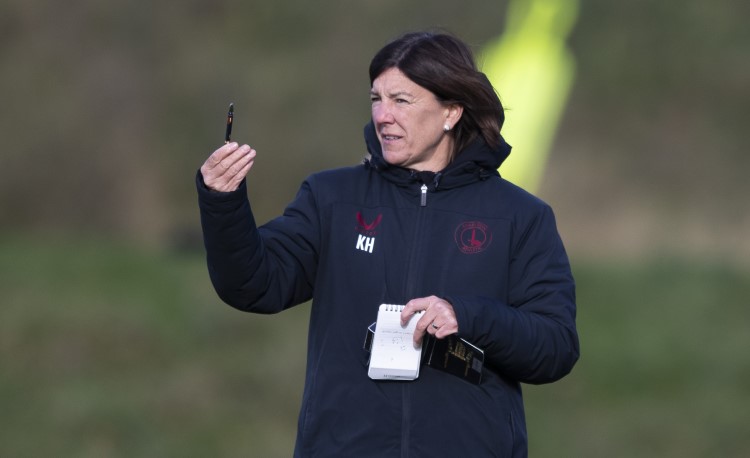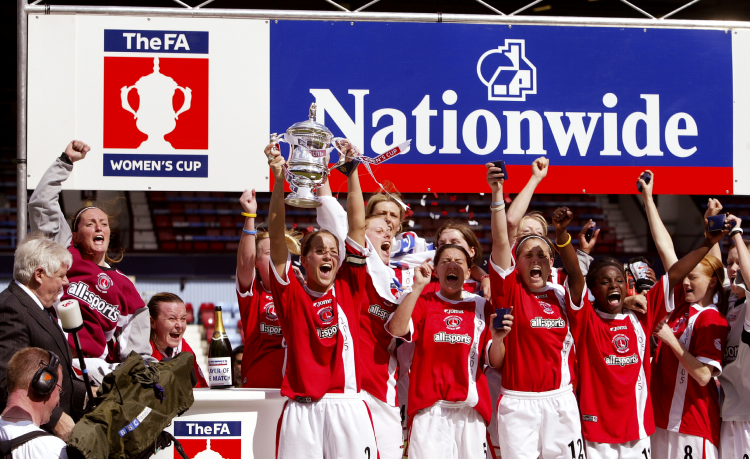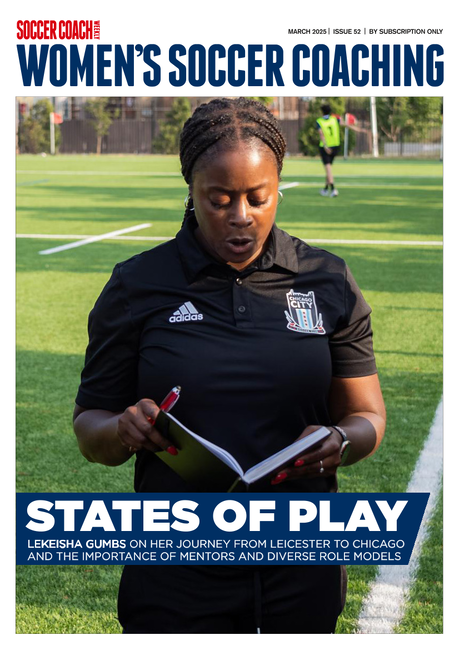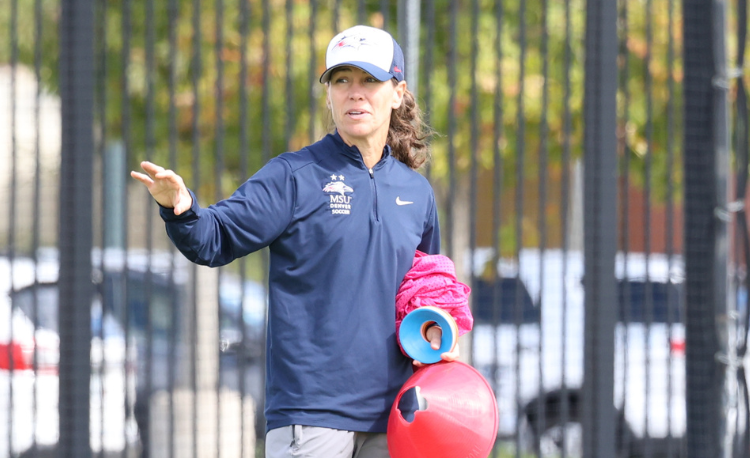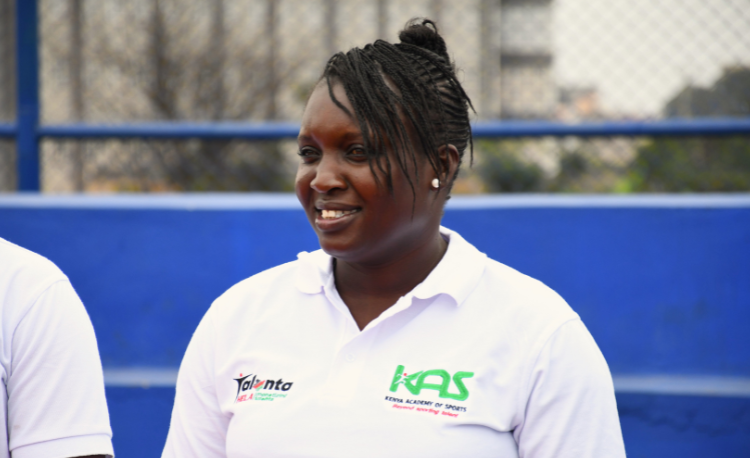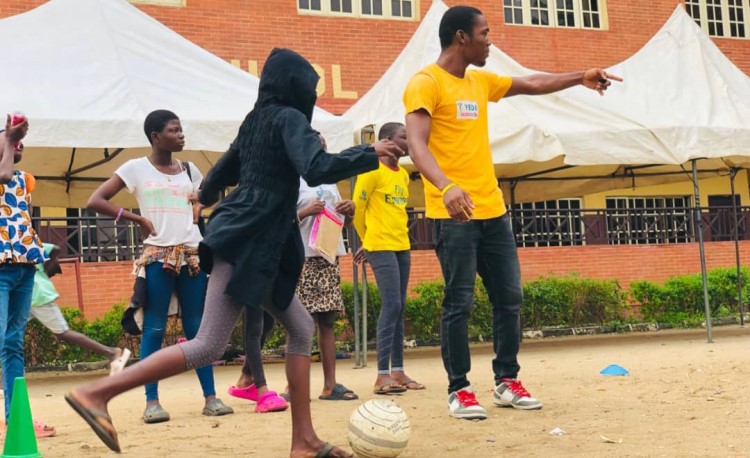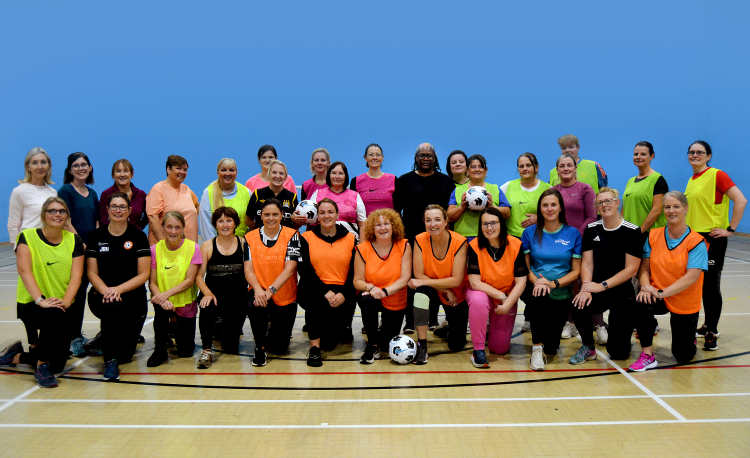You are viewing
3 of your 3 free articles
Karen Hills: Project Charlton
After guiding Tottenham into the WSL and leading their transition to full-time soccer, Karen Hills now has the same task at Charlton Athletic, where she enjoyed success as a player. She explains all to Carrie Dunn.
When Karen Hills lifted the Women’s FA Cup as a player with Charlton Athletic in 2005, she could have had no idea that, within two decades, she would be back at the club as head coach, working with a squad of fully professional players.
After all, back then, she and her team-mates were all playing elite soccer while holding down full-time jobs.
What was more, Hills had not even considered going into football coaching. In fact, she was working as a swimming coach, until one day someone failed to show up to lead the football skills session for tiny tots, and Hills was asked to fill in.
She was a natural, and was invited to lead sessions on Tottenham Hotspur’s Football in the Community programme.
“I realised there were coaching badges,” she recalls, “and attended an FA Level 2 course where I was the only female, which was quite daunting.
“When you’re in the classroom, you felt quite intimidated – but then when you actually went out on the grass and they could see you play, I think their respect grew.
“As you went through the coaching badges in the early stages, it was very much like that for a female. That was the environment that was there at the time.
“At the same time, it made me more determined, because you always have to prove yourself, which isn’t the right thing, but it makes you more resilient and makes you realise you’re good at what you do.
“Things have changed dramatically now: there’s female-only courses and it’s really moved in a positive direction to allow females to feel comfortable and to learn.”
On her climb up the coaching ladder, Hills went on to work alongside two people who have also both featured on the cover of this magazine.
First, shortly after retirement from playing in 2007, she was assistant to Tracey Kevins, who at that time was manager of second-tier club Barnet, but is now head coach of the USA U20s.
In 2009, Hills left Kevins and Barnet behind for a head coach role of her own, at Tottenham Hotspur. Within two years, she would be joined by Juan Carlos Amoros.
Although Tottenham have long been one of the leading clubs in English men’s football, the women’s team were down in the fourth tier when Hills took charge.
During 11 years at the helm – nine of them alongside Amoros – Hills guided Spurs up the leagues and into the top-flight WSL. They parted company with the club in November 2020.
Hills was not out of work for long. In March 2021, she was appointed first-team head coach at Charlton Athletic, another London-based club who were in the second-tier FA Women’s Championship.
When she was given the job, she knew her priority was to prepare the women’s section for professionalisation in the 2021-22 season.
Related Files
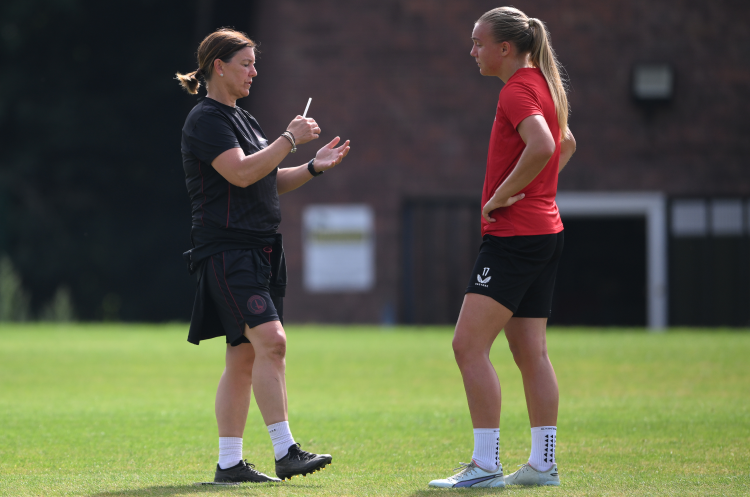
This would no easy or quick task, as she recalled from her experience at Tottenham.
“I knew what it was going to take,” she said. “It was about getting in the door, working with the current players, where the really good work was happening, and if there were any areas that I could improve [in terms of] playing style and the staff behind the scenes.
“The club invested in the women’s department and, over the past three years, we’ve seen a significant change.
“We’re playing at The Valley [Charlton’s main home ground], which is a huge step forward for the club.
“We’ve gone from part-time to full-time. We’ve got our own pitch at [Charlton’s training ground] Sparrows Lane. We’re able to share resources with the men and the academy. We’ve come a long way.”
Promotion to the WSL has, so far, eluded Charlton. But their progress under Hills is highlighted by their final positions in her three full seasons in charge – 5th, 4th and, last season, 2nd, when they were a single point behind eventual champions Crystal Palace.
“The Championship last season was probably the most competitive I’ve seen it,” said Hills.
“A lot of teams were really pushing in a positive direction, and any team could have beaten any other on any given day.
“You have to get the ball rolling from minute one. It comes down to small margins and you have to be on it all the time.
“We were really consistent [but] we probably dropped points where we shouldn’t have. Overall, for a third season, I thought it was a really successful one.”
How you developing consistency is, Hills says, the million-dollar question.
“We do a lot of work in pre-season around the team and togetherness, and people’s roles and responsibilities.
“It’s a bit of a cliche, talking about the process, not the outcome, but that really is what you need to do to have a winning team.
“You also need to keep players with you for a long period of time who understand what it takes.
“We have managed to retain 14 players from last season who were in it all the way to the very end, knew what it was like to win, and knew the areas that we probably needed to be better. Then it’s about just building on that, year after year.
“It took me a long time when I was at Tottenham to get them from tier four all the way to the WSL, but I managed to do it, and it’s the same sort of process and journey that we’re on at Charlton.
“When I took over, we were semi-professional, fighting against relegation; and in three seasons, we’ve managed to turn it around.
“We’ve got a lot of players now that know what it takes to be a Championship player. It’s not easy. It comes down to those small margins, but overall consistency is about the day-to-day behaviours, and how we implement that.
“We don’t get too high with wins and we don’t get too low with the losses. It’s about that consistency of: ‘Are we improving day-on-day? Are we being the best versions of ourselves? Are we giving absolutely everything to drive standards on the pitch?’ And that comes from the top.”
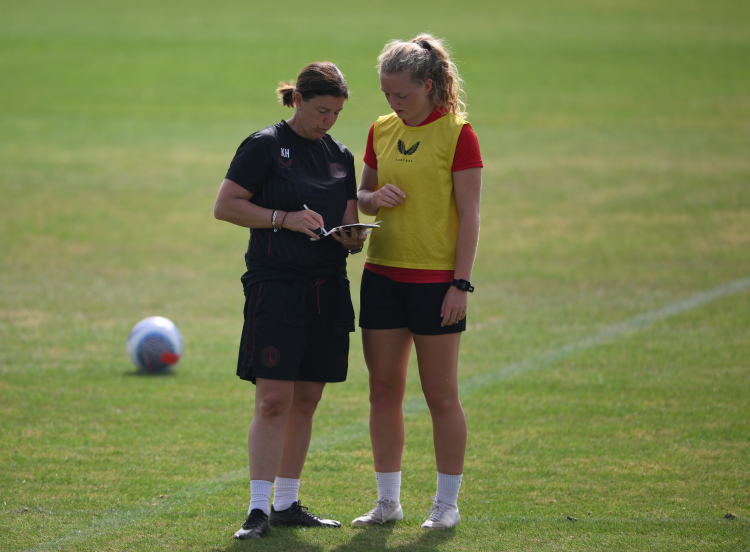
As she has progressed through her coaching career, Hills has valued the network of contacts that she has built.
She says that coaching can sometimes feel quite isolating or lonely, and being able to talk to other people experiencing the same situation can be really helpful.
“You have your family and your friends to come back to, but it’s also good to have these opportunities to sit and chew the fat a little bit, and for them not to judge you and to give you some guidance or support when you’re feeling high, and also when you’re low.”
Hills particularly admires the female coaches working at the top of the game, naming the US national team coach Emma Hayes, former England coach Hope Powell, and current Southampton director of football Marieanne Spacey-Cale as examples of trailblazing role models.
She also enjoys being able to speak to coaches working in the men’s game, and has appreciated the conversations she has had with Charlton men’s managers, expanding her perspective on the game.
It’s not bad for someone who, during the peak of her playing days, never considered coaching at all.
“Now you can see it and believe it: you can be a full-time coach, you can be a full-time player,” she says, reflecting on how quickly professionalisation has transformed the top divisions of women’s football in England.
When she began coaching, she knew that she enjoyed it, but had no plan or pathway to follow – which she thinks in retrospect may have helped her.
“I just did every kind of coaching you could possibly think of,” Hills said. “I always say, ‘Don’t try to miss out the steps on the ladder’.
“Try and really ingrain who you are, what you’re about, enjoy what you do, and keep working hard.
“You can achieve anything now, especially with the amount of opportunities there are within the women’s game.
“It is an exciting place. I think there’s still a lot more to be done, to make the game the best it can be. I’d just like to be a part of that.
“If any young player out there wants to achieve their dreams, then the world is their oyster. But it is hard work, and you’ve got to sacrifice things and be diligent, and also be a bit resilient.
“When you get some knockbacks, you need to go again, because that’s what life’s about.”
GLORY AS A PLAYER OR GLORY AS A COACH - WHICH FEELS BETTER?
The sense of pride Hills feels as a successful Charlton Athletic coach, compared to her previous incarnation as a successful Charlton player, is just as intense, she says – but very different.
“When you’re a player, you’re just thinking about playing,” she said.
“When I played, I was also working full time and travelling three times a week, from north London to south London.
“We had an unbelievable group of talented players that were at the top of the game, and were striving every season to try and win the league.
“You just don’t just see the other side as a player. You come into training, do the session, and you go home.
“When you’re a manager or a coach, you have so many different other factors to consider.
“You’ve got 20-odd players that are in your care, you’ve got staff, you’ve got a way of working.
“So to be successful as a manager or a coach, I think you feel a huge achievement to bring these players with you.”
‘you learn a lot when around peers’ – karen on working towards the uefa pro licence and picking up new ideas
There are still relatively few female head coaches in the top two tiers in England – and comparatively few women with the elite Uefa Pro Licence qualification that Hills is currently working towards.
“I never even thought of looking at getting my Pro Licence,” she said. “From getting my [Uefa] B Licence to doing my A Licence, I think it was nine years.
“I didn’t just try and go through badges to tick it off. You have to do the work on the grass, because that’s where you really learn how to be a coach.
“The courses are set out to give you a structure or a support mechanism, but you really learn a lot when you’re around peers on a day-to-day basis, working with players.”
After taking part in the FA’s female-only Coaching Excellence Initiative, discussing issues of leadership away from the technical detail of coaching, Hills then applied to take the Pro Licence.
Prior to her acceptance, she underwent rounds of testing, including an interview, a written SWOT [strengths, weaknesses, opportunites, threats] analysis of herself, and a day of addressing different tasks with a group of other candidates.
She began the 18-month programme in January 2024, and is already benefiting from it.
“I’ve learned so much on the course, and around the people that are on it. That’s where all the learning takes place on those courses: with like-minded people that are all driven, and that have different experiences within the game. That’s so valuable.
“There’s always an opportunity to learn, and you’ll always pick up new ideas. So, for me, it’s been a real challenge, but I’m enjoying every minute of it.”
Newsletter Sign Up
Newsletter Sign Up
Discover the simple way to become a more effective, more successful soccer coach
In a recent survey 89% of subscribers said Women's Soccer Coaching makes them more confident, 91% said Women's Soccer Coaching makes them a more effective coach and 93% said Women's Soccer Coaching makes them more inspired.
*includes 3 coaching manuals
Get Inspired
All the latest techniques and approaches
Women's Soccer Coaching offers proven and easy to use soccer drills, coaching sessions, practice plans, small-sided games, warm-ups, training tips and advice.
We've been at the cutting edge of soccer coaching since we launched Soccer Coach Weekly in 2007, creating resources for the grassroots youth coach, following best practice from around the world and insights from the professional game.
